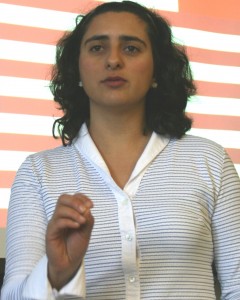For more than 45 years, Colombia has been barraged by a civil war that has resulted in significant violations of human rights.
Now, amid the recent decline of overt war in the South American country, the University of Florida’s College of Education, Levin College of Law and the Center for Latin American Studies have partnered to establish a human rights center at two Colombian law schools closest to the center of conflict.
“Things have settled down compared to the 1990s, but there’s still things going on,” said Pilar Mendoza, a College of Education assistant professor in higher education administration who was born in Colombia. Mendoza is the co-partnership director and co-principal investigator for the project grant.
The three-year effort will be partially funded by the national Higher Education for Development (HED) office with a grant of more than $757,000. The national office works closely with the United States Agency for International Development to mobilize the expertise and resources of the American higher education community to address global development challenges. The participating institutions also provide financial support for the effort.
The human rights center will have an office at the Colombian law schools of the Universidad del Magdalena in Santa Marta and the Universidad del Norte in Barranquilla. The center will offer professional training for law professors, research opportunities, human rights clinics and outreach programs including one in which law students will teach the local Colombian community about human rights.
“The University of Florida faculty at the colleges of Law and Education, and at the Center for Latin American Studies, possess great depth in international law, human rights and experiential learning, and are well suited to achieve the goals of this ambitious program,” said College of Law Dean Robert Jerry.
Although the project has just begun, Mendoza said some important infrastructure is already in place. For example, Mendoza and faculty from the College of Education’s Collaborative Assessment and Program Evaluation Services (CAPES) unit will lead the assessment and monitoring of the new center’s effects.
“The U.S. government is really interested in ensuring what they’re devoting resources to is actually accomplishing the end goals that it sets out to achieve,” said Pedro Villarreal, a CAPES consultant and clinical assistant professor of higher education administration.
The collaboration with Colombian partners began last summer when Mendoza taught a seminar in educational leadership at la Universidad de los Andes in Bogotá, her alma mater, opening the doors to other projects related to the development of higher education in the region.
Then, last May, HED announced a grant opportunity for three U.S. law schools that would partner with Colombian law schools to enhance their programs related to human rights in the Colombian Caribbean.
“I had been involved with Colombia in other projects, and this partnership came at the right time,” Mendoza said.
Mendoza said the partnership is particularly important because it serves as a learning opportunity for the Colombian community, as well as for the United States.
“There are a lot things we can learn from other nations about the way we do things here,” Mendoza said. “We have enough domestic problems here, and I do think it’s beneficial to have an open mind to learn from other models and other systems. Maybe there are better ways to do things.”
SOURCE: Pilar Mendoza, assistant professor in higher education administration, pilar.mendoza@ufl.edu; 352-273-4309
WRITER: Alexa Lopez, new media coordinator, news and communications, UF College of Education; aklopez@coe.ufl.edu; 352-273-4449
MEDIA LIAISON: Larry Lansford, director, news and communications, UF College of Education; llansford@coe.ufl.edu; 352-273-4137
